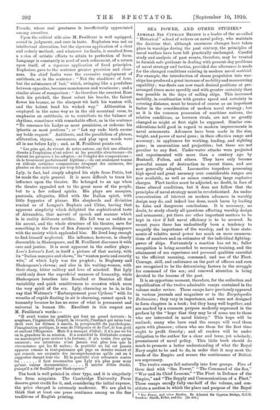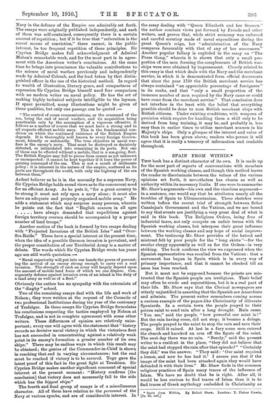SEA POWER, AND OTHER STUDIES.*
ADMIRAL SIR OYFRIAN BRIDGE is a leader of the so-called " Historical" school of writers on naval policy, who maintain the doctrine that, although enormous changes have taken place in warships during the past century, the principles of naval warfare have been left practically unchanged. Careful study and analysis of past events, therefore, may be trusted to furnish safe guidance in dealing with present-day problems of naval strategy and tactics, provided due allowance is made for the changed conditions existing in modern naval materiel. For example, the introduction of steam propulsion into war- ships has produced a great increase of mobility and manoeuvring capability ; war-fleets can now reach desired positions at pre- arranged times more speedily and with greater certainty than was possible in the days of sailing ships. This increased mobility, in combination with greater speed and certainty in covering distance, must be treated of course as an important factor in the consideration of modern naval strategy ; but as it is the common possession of maritime nations, the relative conditions, as between rivals, are not so greatly changed as might at first sight be supposed. Similar con- siderations hold good in regard to modern improvements in naval armaments. Advances have been made in the size, weight, and power of naval guns ; in their effective range and accuracy; in appliances for working, loading, and sighting guns ; in ammunition and projectiles ; but these are not peculiar to any fleet. Under-water attacks were projected and experimented with more than a century ago by Bushnell, Fulton, and others. They have only become powerful means of destruction in recent times, and are now generally adopted. Locomotive torpedoes possessing high speed and great accuracy over considerable ranges are now available, as well as mines containing large explosive charges. Fleet tactics must be adjusted, no doubt, in face of these altered conditions, but it does not follow that the principles of naval strategy must be revolutionised. An undue concentration of interest on modern advances in warship design may do, and indeed has done, much harm by leading to false and dangerous conclusions. It is necessary, no doubt, to study closely all questions affecting warship design and armament; yet there are other important matters to be kept in view if full naval efficiency is to be secured. In recent years there has undoubtedly been a tendency to magnify the importance of the warship, and to base state- ments of relative naval power too much on mere enumera- tions of numbers and on estimates of the individual fighting- power of ships. Fortunately a reaction has set in; fuller recognition is being accorded to necessary training, and the attainment of sea experience and personal qualities essential to the efficient manning, command, and use of the Fleet. Courage, skill, and endurance on the part of officers and men are recognised to be the determining factors in the struggle for command of the sea; and renewed attention is being devoted to the lessons of the past.
It is an opportune moment, therefore, for the collection and republication of the twelve admirable essays contained in the volume under review. These essays have previously appeared in various journals and magazines or in the Encyclopedia Britannica ; they vary in importance, and were not designed to form chapters in a book; but they hang well together, and are marked by a common purpose modestly expressed in the preface by the " hope that they may be of some use to those who are interested in naval history." This hope will be realised ; many who have read the essays will read them again with pleasure ; others who see them for the first time ought to profit thereby ; and all readers will be under obligation to the author for a clear and terse, yet scholarly, presentment of naval policy. This little book should do much to promote a better understanding of what the Royal Navy ought to be and to do, in order that it may meet the needs of the Empire and secure the continuance of British sea supremacy.
The twelve essays fall naturally into four groups. Five of them deal with " Sea Power," " The Command of the Sea," " War and its Chief Lessons," " The Fleet in Defence of the Empire," and "The Supply and Communications of a Fleet." These essays occuty fully one-half of the volume, and con- stitute a section in which the place and purpose of the Royal
• Sea Power, and other Studies. By Admiral Sir Cyprian Bridge, G.C.B. London: Smith, Elder, and Co. [5a. net.]
Navy in the defence of the Empire are admirably set forth. The essays were originally published independently, and each of them was self-contained, consequently there is a certain amount of repetition ; but if it be true that "reiteration is the surest means of conviction," there cannot, in the public interest, be too frequent repetition of these principles. Sir Cyprian Bridge makes full acknowledgment of Admiral Mahan's remarkable work, and for the most part is in agree- ment with the American writer's conclusions. At the same time he brings into prominence the valuable contributions to the science of naval warfare previously and independently made by Admiral Colomb, and the lead taken by that distin- guished officer in the use of the historical method. In regard to wealth of illustration, literary grace, and compactness of expression Sir Cyprian Bridge himself need fear comparison with no modern writer on naval policy. He has the art of making highly technical subjects intelligible to the layman.
If space permitted, many illustrations might be given of these qualities, but only one passage can be quoted :—
" The control of ocean communications, or the command of the sea, being the end of naval warfare, and its acquisition being practicable only by the assumption of a vigorous offensive, it follows as a matter of course that we must have a strong and in all respects efficient mobile navy. This is the fundamental con- dition on which the continued existence of the British Empire depends. It is thoroughly well known to every foreign Govern- ment, friendly or unfriendly. The true objective in naval war- fare is the enemy's navy. That must be destroyed or decisively defeated, or intimidated into remaining in its ports. Not one of these can be effected without a mobile, that is a sea-going, fleet. The British Empire may fall to pieces from causes as yet unknown or unsuspected : it cannot be kept together if it loses the power of gaining command of the sea. This is not a result of deliberate policy : it is inherent in the nature of the empire, scattered as its parts are throughout the world, with only the highway of the sea between them.'
Ardent believer as he is in the necessity for a supreme Navy, Sir Cyprian Bridge holds sound views as to the concurrent need for an efficient Army. As he puts it, "for a great country to be strong it must not rely upon a navy alone : it must also
have an adequate and properly organised mobile army." He adds a statement which may surprise many persons, wherein he points out the fact that "English seamen in all ages . . . have always demanded that expeditions against foreign territory oversea should be accompanied by a proper number of land troops."
Another section of the book is formed by two essays dealing with " Projected Invasions of the British Isles " and " Over- Sea Raids." These have a special interest at the present time, when the idea of a possible German invasion is prevalent, and the proper constitution of our Territorial Army is a matter of debate. The words which Sir Cyprian. Bridge wrote ten years ago are still worth quotation :-
" Naval superiority will put into our hands the power of prevent- ing the arrival of an enemy strong enough to carry out a real invasion. The strength of such an army will largely depend upon the amount of mobile land force of which we can dispose. Con- sequently defence against invasion even of an island is the duty of a land army as well as of a fleet."
Obviously the author has no sympathy with the extremists of the " dinghy " school.
Two of the remaining essays deal with the life and work of Nelson ; they were written at the request of the Councils of two professional Institutions during the year of the centenary of Trafalgar. In these essays Sir Cyprian Bridge formulates his conclusions respecting the tactics employed by Nelson at Trafalgar, and is not in complete agreement with some other writers. These differences of opinion are relatively unim- portant; every one will agree with the statement that" history records no decisive naval victory in which the victorious fleet has not succeeded in concentrating against a relatively weak point in its enemy's formation a greater number of its own ships." There may be endless ways in which this result may be obtained; the genius of the Commander-in-Chief is shown in reaching that end in varying circumstances ; but the end must be reached if victory is to be assured. Togo gave the latest proof of this fact in the great fight at Tsushima. Sir Cyprian Bridge makes another significant comment of special interest at the present moment : "History confirms [the conclusion] that victory does not necessarily fall to the side
which has the biggest ships."
The fourth and final group of essays is of a miscellaneous
character. All of them have relation to the personnel of the Navy at various epochs, and are of considerable interest. In the essay dealing with " Queen Elizabeth and her Seamen " the author combats views put forward by Froude and other writers, and proves that, while strict economy was enforced and careful scrutiny made of naval expenditure during the great Queen's reign, her " administration of the Navy compares favourably with that of any of her euccessors." Another popular fallacy is exploded in the essay on " The Press Gang," wherein it is shown that only a small pro- portion of the men forming the complements of British war- ships were ever obtained by impressment. Closely related to this essay is that which deals with the Navy and the merchant service, in which it is demonstrated from official documents that since the year 1730 the British merchant service has always contained "an appreciable percentage of foreigners" in its ranks, and that "only a small proportion of the immense number of men required by the Navy came or could have come from the merchant service." That conclusion does not interfere in the least with the belief that everything possible should be done to man British merchant ships with British citizens. -Under existing conditions, with weapons of precision which require for handling them a skill only to be derived from long training, it may be, and probably is. less easy than in earlier times to utilise merchant seamen in his Majesty's ships. Only a glimpse of the interest and value of this book has been given above; readers who peruse it will agree that it is really a treasury of information and readable throughout.







































 Previous page
Previous page